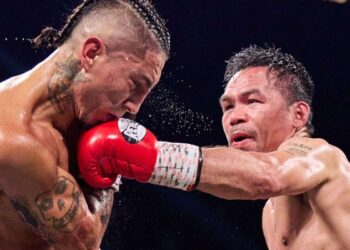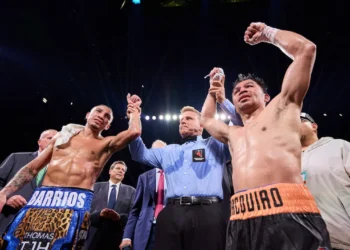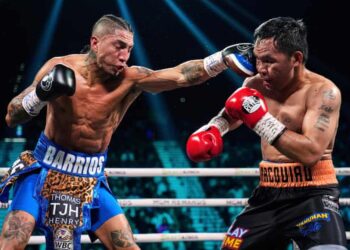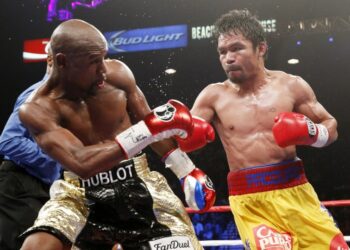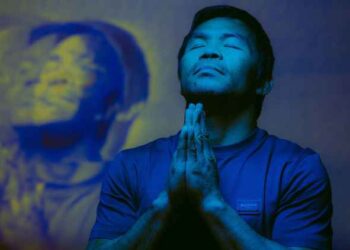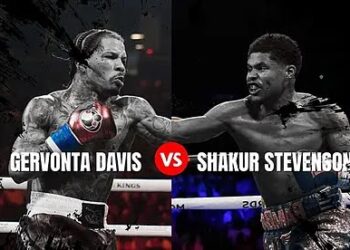Manny Pacquiao, the Filipino boxing legend, finds himself at a crossroads that many great athletes eventually face — the fine line between a glorious legacy and the risk of tarnishing it by fighting too long. The headlines say it all: Pacquiao ‘worried for reputation’ as he extends comeback. For millions who have idolized Pacquiao, this admission is both sobering and symbolic of the burdens that come with greatness.
Pacquiao, now well into his forties, has already defied the odds more times than anyone could count. The only eight-division world champion in boxing history, he has secured his place among the sport’s immortals. From his humble beginnings in General Santos City to becoming a global icon — and even a Philippine senator — Pacquiao’s life story is the stuff of legend. But as he pushes forward with yet another comeback attempt, questions are mounting about whether he is risking more than just physical harm — whether he is gambling with the very reputation that makes him beloved worldwide.
The recent buzz began when Pacquiao announced plans to fight again despite having been out of the professional ring since his loss to Yordenis Ugas in 2021. That bout, which ended in a unanimous decision against him, seemed to close the chapter on a glittering career. He subsequently turned his focus to politics, running for president of the Philippines in 2022 — a bid that ultimately fell short. Now, with his political ambitions in flux and an undying love for the fight game, Pacquiao seems determined to lace up his gloves yet again.
Sources close to the Pacman say he is genuinely concerned about how this latest return will affect his legacy. “He knows what’s at stake,” one longtime member of his camp said. “He doesn’t want to be remembered as someone who didn’t know when to walk away.” Yet for a fighter who has spent more than two decades overcoming doubters, the lure of the ring is as potent as ever.
It’s a storyline boxing fans know too well. Muhammad Ali, the man Pacquiao idolized, fought past his prime, absorbing unnecessary punishment in losses to Larry Holmes and Trevor Berbick. Roy Jones Jr., another all-time great, tarnished what could have been an untouchable résumé by refusing to retire until he was long past his peak. Pacquiao, with his speed diminished by age but his fighting spirit undimmed, risks joining that list if this comeback goes poorly.
Why does Pacquiao continue to fight? Part of it is surely financial. Despite the hundreds of millions he’s earned, he has faced rumors of unpaid taxes and funding expensive campaigns. But money alone doesn’t explain it. For Pacquiao, boxing is more than a profession — it’s his identity. The roar of the crowd, the bright lights, the knowledge that he’s representing not just himself but an entire nation — these are powerful motivators for a man who has never known how to live without the thrill of competition.
This latest comeback also comes at a complicated time for boxing itself. The sport is awash with big-money exhibitions and novelty fights that blur the line between competition and spectacle. Pacquiao has dabbled in this space too, facing Korean YouTuber DK Yoo in an exhibition match in 2022. He’s hinted at more lucrative exhibitions, but he insists he still wants “real fights” — real opponents, real titles. That is where the real danger lies: real fights mean real risks, both to his health and to his mythic status.
Fans are divided. Many long-time supporters plead with him to stay retired, urging him to protect the legend they so fiercely admire. Others, equally loyal, can’t help but cheer at the chance to see their hero in the ring one more time. Boxing is unforgiving, though, and the margin for error shrinks dramatically when reflexes slow down and the legs don’t move quite the same way they did when you were 25.
Pacquiao’s handlers are said to be pushing for a carefully selected opponent — someone with enough name recognition to sell tickets but not enough threat to inflict serious damage. But even this approach feels like a delicate balancing act. One bad night, one mistimed punch, and the lasting image of Manny Pacquiao could shift from world-beating warrior to aging fighter who stayed too long.
In the end, the decision is his alone. Pacquiao has earned the right to chart his own course, just as he always has. Yet his own admission of worry about his reputation shows a rare vulnerability for a man known for fearlessness inside and outside the ring. It is an acknowledgment that legacies can be fragile things, even for someone as revered as Manny Pacquiao.
For now, the world waits and watches. Will the Pacman defy the odds one more time and exit on his own terms? Or will his story become another cautionary tale of a champion who didn’t know when to let go? Whatever happens, Pacquiao’s greatness is secure — but his final chapter is s
till being written.

